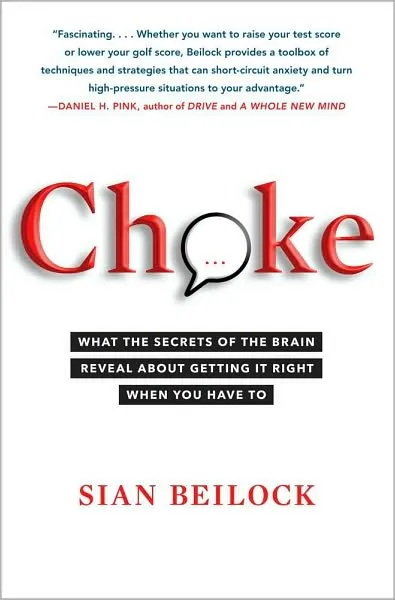
Everyone has to perform under pressure at some time in their lives. Athletes competing, scientists giving a presentation, job seekers interviewing are just a few examples.
A recent speaker at NIH offered insight into how to harness your stress for better performance and ways to help restore your creativity and resilience when you are under stress. Sian Beilock of the University of Chicago researches performance under pressure and says how we view stress affects how we manage it. For a moment, consider your emotional responses to stress. Your mindset matters and can affect your performance. Stress can cause some people to start fearing failure. Then, their thoughts become focused on all the ways that they can fail at a particular task. However, you can refocus your brain by focusing on the reasons you should succeed, instead of the ways you can fail.
Focus on the Big Picture
Often under pressure, we focus too much attention on how all the little details contribute to our main goal. This then makes every detail a possible area of failure that we believe will be impossible to overcome. By taking a step back and focusing on the big picture (or the main goal we wish to achieve) we limit the possible failures and again focus on our one big success. Giving too much attention to details or dwelling on the details of a mistake, rather than trusting in a well-practiced process is often the problem when people choke (defined as not performing to their normal level of competency) under pressure.
Trust in Your Preparation
Rarely do we go into a high stress situation with out preparing for it. It is important to trust in your preparation. Remind yourself before and during the situation that you have prepared and practiced and that you are ready to achieve your big goal. After you prepare and practice it’s important to focus on the outcome you want to achieve. Some examples:
- Practicing in a sport like golf, focus on where the ball should land with a mantra like “Swing Through” rather than worrying about each detail like “What did I just do with my elbow?”
- Practicing for an interview, focus on the big picture of how interested you are in the job and how excited you are to be talking with your interviewers rather than worrying about the exact words to say to answer each question. You could give yourself a simple manta like “Communicate” or “Engage”.
What can you do when you are facing multiple stressors?
Our prefrontal cortex is an area of the brain that is responsible for personality expression, decision making and complex cognitive planning, among other things. Beilock noted that this area has limited attention resources in stressful or high pressure situations, and that our creativity can be stunted. However, there are ways we can unburden our prefrontal cortex and allow our creativity to work freely. How do you restore important connections in your pre-frontal cortex then? Especially when they can get hijacked by multiples stressors? Here are some practical ways to wake up your creativity:
- Walk away from a problem and come back. Focus on nature. Take a walk in the woods or even look at pictures of nature on your computer. You can use the break time to see things in a new and unusual way.
- Sleep, get needed rest.
- Talk with someone else. Considering a different perspective will help restore your creativity in problem solving.
- For high stakes situations, practice in a similar situation – most importantly with people’s eyes on you. Beilock’s work suggests that practicing under stress improves performance. For example, before an interview, practice with a career counselor, mentor or friend. The minor stress of practicing with another person can help to prepare you for the actual interview.
- Journal – use free association and just write for 5-10 minutes before a high pressure event or test to clear your mind.
- Use mind/body exercises like power posing and meditation that will help you manage your feelings and reactions in stressful situations.
The event “How to Perform Your Best Under Stress” can be viewed at:
NIH only videocasts at:http://www.videocast.nih.gov/Summary.asp?File=18937&bhcp=1 If you would like to meet with a career counselor to talk about how to be more effective in your job search or interview situations, go to: https://www.training.nih.gov/career_services/appointments
If you would like to meet with a counselor to talk about dealing with challenges that impact your ability to work effectively or other wellness concerns, email [email protected]




